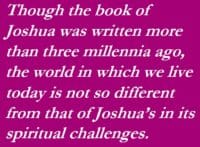Introduction: Second Chances – The Book of Joshua
The book of Joshua marks the transition from the leadership of Moses to that of Joshua. It begins with the story of Israel entering the Promised Land and ends with them settled in that land.
Joshua, indeed, had a tough act to follow. That is, to pick up where Moses (Moses!) had left off. But that challenge was only the beginning. Joshua was to do what Moses never did: take the nation, after 40 years in the desert, across the Jordan and into Canaan, according to the promise that God had made to the fathers years before.
“Moses My servant is dead. Now therefore, arise, go over this Jordan, you and all this people, to the land which I am giving to them—the children of Israel” (Josh. 1:2, NKJV).
The key to the whole story is found here, in the Lord’s words to Joshua: they are going to enter “the land which I [YHWH] am giving to them.”
Yes, Joshua is not going to do it alone, but only through the power and guidance of the Lord, who would have brought the people into the land a generation earlier had they obeyed their end of the covenant. Unfortunately, they didn’t, and thus, they met the consequences of their actions.
The fact is, during the preceding 40 years, Israel had faced the negative side of the covenant. Because of their rebellion against God, the entire adult generation who experienced the wonders and marvels of Exodus, with the exception of Caleb and Joshua, perished in the desert. Four of the five books of Moses deal with what happened to them as they wandered in the desert all that time. Now, under the leadership of Joshua, the second generation was ready to undertake the challenges of possessing the land.
“Then Moses called Joshua and said to him in the sight of all Israel, ‘Be strong and of good courage, for you must go with this people to the land which the LORD has sworn to their fathers to give them, and you shall cause them to inherit it. And the LORD, He is the One who goes before you. He will be with you, He will not leave you nor forsake you; do not fear nor be dismayed” (Deut. 31:7, 8, NKJV).
The promises of God given to the patriarchs and to Moses are about to be fulfilled. There is an air of expectation and excitement, a new beginning for the people, long homeless and dispossessed. God has been faithful in delivering them from slavery, and He can certainly be trusted to fulfill His promises concerning the land.
 “The primary purpose of the book of Joshua is to describe Israel’s entry into the land of promise, the conquest of the land, and its division among the tribes. This purpose underlies the message of the book, namely, the faithfulness of God in fulfilling the promise of land made to Abraham. The book emphasizes God’s faithfulness to His covenant promises (Josh. 21:43-45).”—Andrews Bible Commentary (Andrews University Press, 2020), p. 365.
“The primary purpose of the book of Joshua is to describe Israel’s entry into the land of promise, the conquest of the land, and its division among the tribes. This purpose underlies the message of the book, namely, the faithfulness of God in fulfilling the promise of land made to Abraham. The book emphasizes God’s faithfulness to His covenant promises (Josh. 21:43-45).”—Andrews Bible Commentary (Andrews University Press, 2020), p. 365.
We will discover together that, though the book of Joshua was written more than three millennia ago, the world in which we live today is not so different from that of Joshua’s in its spiritual challenges. We might face challenges of a different nature, but nonetheless there are challenges, especially spiritual ones, that threaten our security, our faith, and the fulfillment of the mission God has entrusted to His people. The example of Joshua will certainly inspire us to claim God’s promises concerning our times and to succeed through His power, as he did.
Barna Magyarosi currently serves as the executive secretary of the Inter-European Division and chair of the Biblical Research Committee of the division. He began his service for the church as a pastor and department director in the South Transylvania Conference, Romania, and continued as a theology teacher and president of Adventus University, Romania.


This quarter will be a great journey; the best way to end the year – Joshua
“Attitude That Delays Blessings”
In his book “Lord, Change My Attitude Before It’s Too Late,” James MacDonald points out something we often forget: the children of Israel wandered in the wilderness not because God wasn’t able to deliver them, but because their negative attitudes kept them from stepping into the blessings He had prepared. They were freed from Egypt in a single night, but it took forty years for Egypt to come out of them. Their complaining, grumbling, and lack of trust delayed their entry into the Promised Land. Scripture warns us plainly: “Do not grumble, as some of them did—and were destroyed by the destroyer” (1 Corinthians 10:10).
God had already promised them a land flowing with milk and honey (Exodus 3:8). The blessing was theirs, but their attitudes turned an eleven day journey (Deuteronomy 1:2) into forty long years of wandering. Hebrews reminds us of God’s verdict: “They shall not enter my rest” (Hebrews 3:11). The lesson is clear our attitude can delay, or even derail, the very blessings God intends for us. That’s why Paul tells us, “Let us not grow weary in well-doing, for in due season we shall reap, if we do not lose heart” (Galatians 6:9). When we wait on the Lord with the right spirit, Isaiah promises that we will rise up on wings like eagles, run and not grow weary, walk and not faint (Isaiah 40:31). Let us pray for a spirit of complaint, unbelief, or rebellion delay our blessing. The Promised Land is not just a place it’s the abundant life Jesus came to give (John 10:10). If we guard our hearts and walk in faith, we won’t wander in circles we’ll step into the fullness of God’s promises.
Powefull insight:”They were freed from Egypt in a single night, but it took forty years for Egypt to come out of them”
God is patient and long-suffering, waiting before giving the commission to ‘go ahead’ until we are ready. Moses received his assignment to ‘go-ahead’ at the encounter with God at the ‘Burning Bush’. Joshua was ready to push forward at the time he returned from the reconnaissance mission into the ‘promised land’, but he needed to wait until the timing was right.
Only when it was the time God saw as the ‘right time’, was he commissioned to ‘go-ahead’ with the second phase of the journey – to conquer the enemy and settle and establish the children of Israel in their new homeland. God used ‘time’ to allow them to get to know Him better, installing a new ‘leadership team’ given a new assignment.
What has our journey accomplished? What did we, and what are we still learning whiles being formed to be use as a vessel called to ‘go-ahead’ and honor God’s Will in His Glory?
Imagine fainting yards from the finish line in a marathon that you’ve been training for your whole life. And also imagine that due to your age and health you get no more chances to try, as you rally off the ground you see the “Finish Line” banner and you know that today would be your last run and you would never meet the goal you’d had ever since you could remember. With Israel’s eternity at stake, it must have been even that much more serious and heartbreaking for Moses knowing that the people he had led, through God’s grace and power, out of Egypt toward this inheritance promised by God were now all going to die in the wilderness. And even he himself would not step his feet into the land he had dreamed of (Deut. 3:23-27). There are 2 bright spots in this story for Moses though (3 if we include that he was translated to heaven after his death). Caleb and Joshua showed their faith in God and they would go into the Promised Land.
Reading a commentary, I just learned something interesting. Joshua was a member of the tribe of Ephraim, and Caleb was from the tribe of Judah. These two men who bravely stand on God’s promise of victory, of the tribes of Ephraim and Judah, were from the two tribes that Jacob had blessed with the firstborn blessing to become the leaders of Israel. And it was Ephraim and Judah who would one day become dominant over the other tribes of Israel. Ephraim was the leader of the 10 northern tribes maintaining the name Israel, and the tribe of Judah became the leader of the 2 southern tribes bearing his name. So Caleb had descended from Judah. Remember Judah was a man who had made many errors and committed sins such as selling his brother Joseph into slavery, but Judah had been growing in God’s grace. Even though he was Jacob’s 4th-born son, he had shown multiple times in the end chapters of Genesis that he had repented of his sins and that he had grown into a man of significant character, unlike his 3 older brothers. So now we see Caleb, a man also of faith, had descended from Judah and was the grandfather (with many “greats” before it) of David and Solomon and Jesus Himself. And Joshua had descended from Joseph’s son Ephraim who had also received a first-born birthright blessing from Jacob even though he was a grandson and even though he had an Egyptian mother…and we see that the tribe of Ephraim always struggled with idolatry and morality…and the northern kingdom eventually fell, leaving Judah as the last surviving part of Israel (the name “Jew” comes from “Judah”). My take-away is that one’s relationship with God does affect future generations many times over down the road….faith is a personal choice, but its influence is passed on through parenting and home influence.
Veey mportant reflexion: “one’s relationship with God does affect future generations many times over down the road….faith is a personal choice, but its influence is passed on through parenting and home influence.
This has brought a very good point…our choices today affects the tomorrow of our generation…what legacy …foot print..history are we leaving for our generation…this means but of us is the influence of where we are coming from..God we need you to choose you now…
I just got in youch with your page. I’m from Argentina, how could I be part of this group in order to participate?
Thank you very much!!
You have come to the right place Hugo – Welcome and we look forward to your participation. I have sent you and email confirming this.
Thank you so much! I was looking for in the Internet about the priesthood of Melchizedec when I found this page and liked the style and respect of the comments. Thanks again
Thank you Esther, I always enjoy and am so well informed by your thoughtful comments. Also thank you for the history lesson it helped put some things in context.
I fully understand why the children of Isreal did not enter the promised land quickly and allowed their children to enter instead of the rebellious adults.